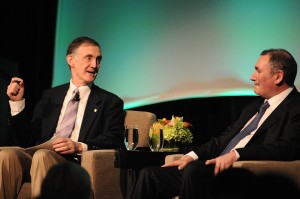
UW CSE's Ed Lazowska interviews F5 Networks' John McAdam at the "State of Technology" luncheon (Ashley Genevieve photograph)
Higher Education was a recurring theme today at the annual Technology Alliance “State of Technology” luncheon in downtown Seattle.
Technology Alliance chair (and UW CSE alum) Jeremy Jaech presented the results of the most recent Technology Alliance economic impact study. According to GeekWire:
“Jaech also sounded the alarm about education funding, thanking the governor and state legislature for stemming the tide of cuts, but saying that more needs to be done to expand the pool of homegrown engineering talent. ‘I believe we are screwing up if we allow this increasing mismatch between job creation and talent production to continue,’ he said. ‘We’re going to have to engineer our own future, and I mean that literally. We need engineers, and lots of them.'” Read the GeekWire post here.
Later in the program, UW CSE’s Ed Lazowska interviewed John McAdam, CEO of Seattle’s F5 Networks. Again according to GeekWire:
“F5 Networks has been operating in the Seattle area for more than 15 years, quietly building one of the biggest success stories of the tech community. But even though it boasts a market value of $9.25 billion and employs 2,800 worldwide, few people — even those in its home town — really know what F5 is all about. Heck, most folks didn’t even know that its name is actually taken from the hit movie ‘Twister.’ … University of Washington computer science professor Ed Lazowska, who moderated the discussion, described F5 as a ‘hidden gem’ and started the talk with this very blunt question: ‘What on Earth is that that you folks do at F5?’ … Asked what government could do to help support the tech ecosystem, McAdam echoed earlier remarks by Technology Alliance Jeremy Jaech about the importance of supporting education.” Read this GeekWire post here.
Read an excellent Seattle Times article describing the entire event here. Read more →
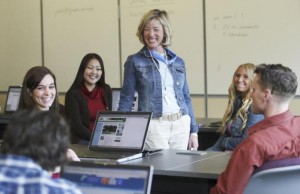 Janet Ash, an engineering instructor at Green River Community College, has been honored multiple times by UW CSE as an “inspirational teacher” – nominated by her former students who are now UW CSE majors.
Janet Ash, an engineering instructor at Green River Community College, has been honored multiple times by UW CSE as an “inspirational teacher” – nominated by her former students who are now UW CSE majors.
“As a kid, Janet Ash listened to Gilbert and Sullivan operettas, played Chopin nocturnes on the piano, read anything she could get her hands on.
“The very crucible into which nerds are poured, you say? Yep. And Ash is proud of her lineage. Nerds, she insists, flock to her.
“‘I think I’m a bit of a nerd magnet,’ Ash says.”
Read more of this wonderful profile in the Auburn Reporter here. Learn more about the UW CSE “inspirational teacher” recognition program here.
Warm thanks, and warm congratulations, to Janet and to all of Washington’s inspirational teachers! Read more →
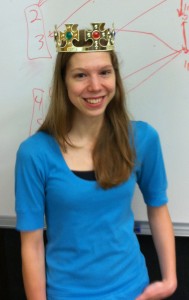 Only slightly embarrassed at receiving the CSE version of the UW President’s Medal.
Only slightly embarrassed at receiving the CSE version of the UW President’s Medal.
Congratulations! Read more →
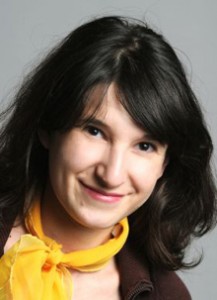
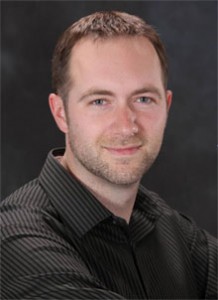 Jeff Heer, currently a computer science faculty member at Stanford University, will be joining UW CSE. Jeff is a superb researcher in the design of interactive, visual data-analysis tools, as well as tools for data cleaning and transformation. A UC Berkeley Ph.D. alum, Jeff is the recipient of a Sloan ResearchFellowship and a Technology Review TR35 Award.
Jeff Heer, currently a computer science faculty member at Stanford University, will be joining UW CSE. Jeff is a superb researcher in the design of interactive, visual data-analysis tools, as well as tools for data cleaning and transformation. A UC Berkeley Ph.D. alum, Jeff is the recipient of a Sloan ResearchFellowship and a Technology Review TR35 Award.
In addition, Daniela Rosner, who combines backgrounds in both graphic design and computer science, will be joining the UW Department of Human Centered Design and Engineering (HCDE). Daniela is completing her Ph.D. at UC Berkeley’s Information School; her research focuses on the impact of culture and technology on the artifacts we create.
Jeff and Daniela will add tremendous strength to CSE, HCDE, and UW – particularly to the large consortium of researchers working on Human-Computer Interaction and Design at UW as part of “dub,” and, in Jeff’s case, also to efforts in data-driven discovery through the eScience Institute. Coming on the heels of the recruiting of machine learning experts Carlos Guestrin and Emily Fox, and of social media expert Kate Starbird, it’s a game-changing year for the University of Washington’s leadership in these areas.
We are thrilled to welcome Jeff and Daniela to the University of Washington! (They will arrive in 2013.) Read more →
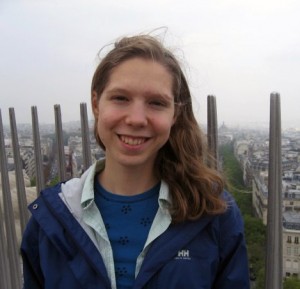 The University of Washington President’s Medal is awarded annually to the most accomplished student in UW’s 7500-member senior class.
The University of Washington President’s Medal is awarded annually to the most accomplished student in UW’s 7500-member senior class.
Congratulations to CSE’s Melissa Winstanley, the 2012 University of Washington President’s Medalist!
Melissa – a graduate of Bellevue High School – is a dual major in Computer Science and Music. She began her CSE career as the top student (out of 475) in CSE 142 and the top student (out of 297) in CSE 143. She has managed to continue this extraordinary academic trajectory while serving as head Teaching Assistant for CSE 143 for the entire 2011-12 academic year, serving as chair of UW’s ACM-W chapter, performing as saxaphone principal in the University of Washington Wind Ensemble, serving as an Honors Peer Mentor, and carrying out a year-long honors research project on mobile tools for public health. Her summers have included two internships with Google, a research internship with UW’s Community Ecology Lab, and a UW Honors Program summer in Rome.
UW CSE is blessed with many extraordinary students, and we’re proud of all of them. UW awards 4 high scholarship medals each year – to the University’s top freshman, sophomore, junior, and senior. Since 2000, seventeen CSE students have won these medals. In other words, one third of the UW scholarship medal recipients in that period have been CSE students! See previous UW CSE winners of UW’s Freshman, Sophomore, Junior, and President’s Medals here. Read more →
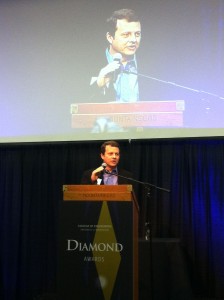
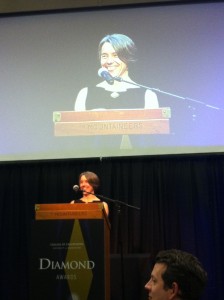 This evening, the University of Washington College of Engineering honored five extraordinary alums with 2012 Diamond Awards. Among the honorees were two UW CSE Ph.D. alums: Greg Badros and Anne Condon.
This evening, the University of Washington College of Engineering honored five extraordinary alums with 2012 Diamond Awards. Among the honorees were two UW CSE Ph.D. alums: Greg Badros and Anne Condon.
Read about the accomplishments of Greg and Anne – and the other Diamond Award recipients – here.
Watch a tribute video to Greg here.
Watch a tribute video to Anne here. Read more →
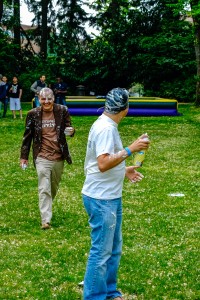
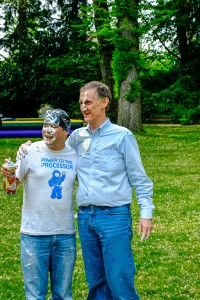
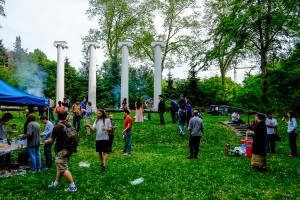 A good time was had by all!
A good time was had by all!
Especially by Luis Ceze, Ed Lazowska and Mark Oskin who – discouraged by the undergraduates’ ineptitude at tossing creme pies at them, took the law into their own hands.
More Bruce Hemingway photographs here. Read more →
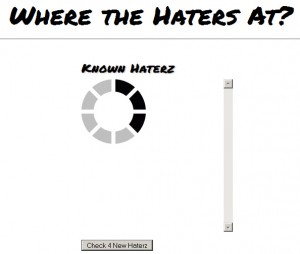 Last weekend, Marty Stepp and the student ACM officers hosted our annual Hack-U competition, sponsored by Yahoo! The contest gives undergraduate groups of 3-4 up to 24 hours to come up with interesting web applications. We had a total of 88 students compete on 28 teams, with many of the students pulling an all-nighter in the Gates Commons to finish their work.
Last weekend, Marty Stepp and the student ACM officers hosted our annual Hack-U competition, sponsored by Yahoo! The contest gives undergraduate groups of 3-4 up to 24 hours to come up with interesting web applications. We had a total of 88 students compete on 28 teams, with many of the students pulling an all-nighter in the Gates Commons to finish their work.
There were lots of fun entries this year, such as: A role-playing game called DevKnull that runs in the browser; a Facebook add-on called “Where the Haters At?” that lets you see when people unfriend you and taunt them for it; a word game where you have to type words quickly before they run into you and kill you; a multi-player Asteroids spaceship game; a 3-D Pokemon game that uses the Google Earth API; a Spotify add-on that recommends music to you based on what your friends are listening to; and many more. As always, our students created impressive results in a short time.
Check out the results, and try out the apps in your browser, here.
Many thanks to Marty and the ACM officers, particularly James Athappily – and to Yahoo! and Google for funding and prizes. Read more →
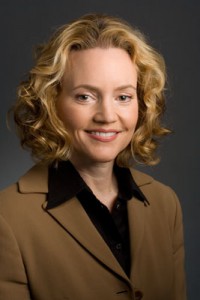 Kim Polese is a leading Silicon Valley entrepreneur and innovator. She will speak on Thursday at 3:30 in EEB 105 on “The Journey of the Entrepreneur.” She will discuss her experiences from 25 years in Silicon Valley founding and leading groundbreaking technology projects and software companies, sharing stories from the trenches, lessons learned, and insights about what it takes for a promising technology to become an innovation that changes the world.
Kim Polese is a leading Silicon Valley entrepreneur and innovator. She will speak on Thursday at 3:30 in EEB 105 on “The Journey of the Entrepreneur.” She will discuss her experiences from 25 years in Silicon Valley founding and leading groundbreaking technology projects and software companies, sharing stories from the trenches, lessons learned, and insights about what it takes for a promising technology to become an innovation that changes the world.
Ms. Polese earned a Bachelor’s degree in Biophysics from the University of California, Berkeley and studied Computer Science at the University of Washington.
Complete information here. Please join us! Read more →
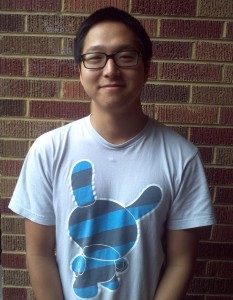 UW CSE bachelors alumnus Willy Cheung has won a 2012-13 Fulbright Scholarship.
UW CSE bachelors alumnus Willy Cheung has won a 2012-13 Fulbright Scholarship.
The Fulbright Program is the flagship international educational exchange program sponsored by the U.S. government and is designed to increase mutual understanding between the people of the United States and the people of other countries. Since its establishment in 1946 under legislation introduced by the late U.S. Senator J. William Fulbright of Arkansas, the Fulbright Program has given approximately 300,000 students, scholars, teachers, artists, and scientists the opportunity to study, teach and conduct research, exchange ideas and contribute to finding solutions to shared international concerns.
Congratulations to Willy! He joins UW CSE alum Chris Raastad, who won a Fulbright last year. Read more →















